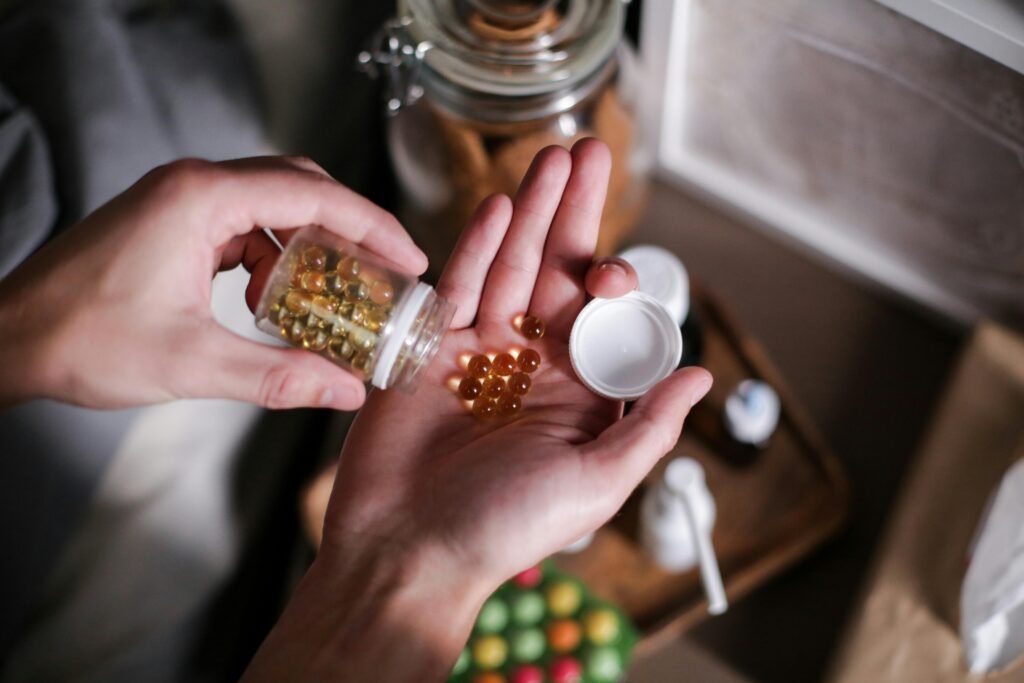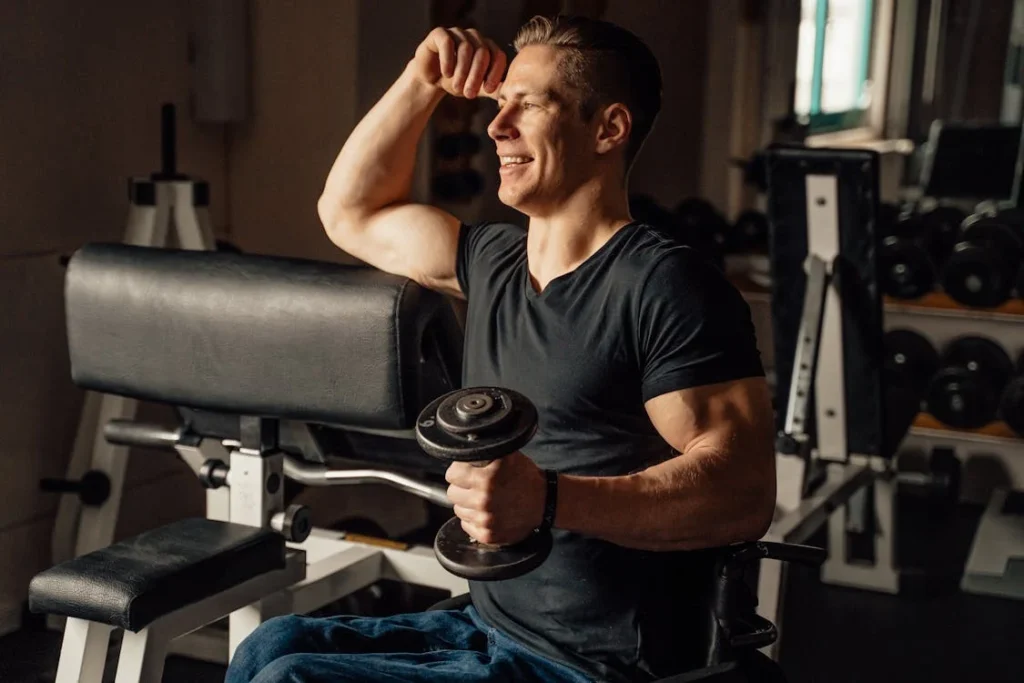Proper nutrition is essential for amputees to support healing, maintain energy, and adapt to prosthetic use. While a well-balanced diet provides most of the necessary nutrients, some amputees consider supplements to fill nutritional gaps or improve specific health concerns. Supplements can play a role in faster recovery, stronger bones, better circulation, and reduced inflammation. However, not all supplements are beneficial, and some may even cause unwanted side effects or interfere with medications.
Understanding which supplements help and which ones to avoid is key to making informed choices. The right combination of vitamins, minerals, and nutrients can promote muscle strength, improve prosthetic comfort, and enhance overall well-being. But taking unnecessary or low-quality supplements can lead to imbalances, digestive issues, or increased risk of complications.

Essential Supplements for Amputees and Their Benefits
The body undergoes significant changes after an amputation, and certain nutrients become even more important for recovery, strength, and daily function.
While a well-balanced diet should always be the priority, supplements can provide additional support when specific nutrients are lacking. Choosing the right supplements can help amputees heal faster, maintain muscle strength, and improve overall health.
Protein Supplements for Muscle Strength and Recovery
Muscle loss is common after an amputation, especially if mobility decreases during the recovery phase. Protein is essential for rebuilding muscles, supporting tissue repair, and maintaining overall strength.
For those who struggle to get enough protein through food alone, protein supplements can be beneficial. Whey protein is a fast-digesting option that helps the body recover after activity, while plant-based proteins like pea or soy protein provide alternatives for those who prefer non-dairy options.
Collagen supplements are another great choice for amputees, as collagen plays a key role in maintaining skin elasticity, joint health, and connective tissue strength.
Since the residual limb is under constant pressure from the prosthetic socket, collagen can help keep the skin and underlying tissues strong, reducing the risk of irritation or pressure sores.
Calcium and Vitamin D for Bone Strength
Bone health is a major concern for amputees, particularly those with lower-limb prosthetics. The remaining limb takes on more weight and stress, increasing the risk of joint pain and bone weakening over time.
Calcium is essential for maintaining strong bones, but without enough vitamin D, the body cannot absorb calcium properly. Many people do not get enough vitamin D from sunlight alone, especially those who spend long hours indoors or have darker skin.
Taking a vitamin D supplement along with calcium ensures that bones remain strong and resistant to fractures.
Magnesium is another mineral that supports bone health while also playing a role in muscle function. It helps prevent muscle cramps and supports nerve function, making it easier to maintain balance and coordination while using a prosthetic.
Magnesium is often found in leafy greens and nuts, but those who do not consume enough of these foods may benefit from a supplement.
B Vitamins for Energy and Nerve Health
Fatigue is a common issue among amputees, especially during the adjustment period when the body is working harder to perform daily activities.
B vitamins, particularly B12 and B6, help convert food into energy and support nerve health. These vitamins are essential for preventing nerve pain, which can sometimes develop due to changes in circulation or nerve sensitivity after an amputation.
B12 is mostly found in animal products like meat, eggs, and dairy, so vegetarians and vegans may require a supplement.
Those experiencing nerve pain, tingling, or sensitivity in the residual limb may benefit from additional B vitamin support, as these nutrients are known for their role in maintaining healthy nerve function.
Omega-3 Fatty Acids for Reducing Inflammation
Inflammation can be a major issue for amputees, particularly around the residual limb where the prosthetic socket creates pressure and friction. Omega-3 fatty acids, commonly found in fish oil, flaxseeds, and walnuts, help reduce inflammation and promote better circulation.
Good blood flow is essential for keeping the residual limb healthy and preventing complications such as pressure sores or infections.
Supplementing with omega-3s can also support joint health, reducing stiffness and discomfort that may arise from changes in weight distribution.
For those who do not eat enough fatty fish, an omega-3 supplement can be a good addition to their daily routine. However, it is important to choose high-quality fish oil supplements that are free from heavy metals and contaminants.
Iron for Circulation and Energy Levels
Iron deficiency can lead to fatigue, dizziness, and poor circulation, which are common complaints among amputees. The body relies on iron to produce red blood cells that carry oxygen throughout the body, including to the residual limb.
Poor circulation can slow healing and increase discomfort when using a prosthetic.
Those who experience frequent tiredness, cold extremities, or lightheadedness may need to check their iron levels. While iron supplements can be helpful, they should only be taken when needed, as excess iron can cause digestive discomfort and other health issues.
Eating iron-rich foods like spinach, lentils, and lean meats is the best approach, but supplementation may be necessary in cases of deficiency.
The right combination of supplements can make a significant difference in an amputee’s overall health, energy levels, and prosthetic comfort.
However, it is important to use them wisely and ensure that they complement a healthy diet rather than replace it. Taking supplements without understanding their effects can lead to imbalances or unnecessary health risks.

Supplements That May Cause More Harm Than Good
Not all supplements are beneficial for amputees, and some can even lead to unwanted side effects, interfere with medications, or cause imbalances in the body.
While the right supplements can support healing, muscle strength, and overall well-being, taking the wrong ones or using them in excessive amounts can create new health problems. Understanding which supplements to avoid is just as important as knowing which ones to take.
Excessive Protein Supplements and Kidney Strain
While protein is necessary for muscle repair and strength, taking too much protein in supplement form can put stress on the kidneys, especially for those with preexisting kidney issues.
Many amputees assume that drinking multiple protein shakes per day will speed up muscle recovery, but excess protein that the body does not need gets converted into waste, which must be processed by the kidneys.
Over time, this can lead to kidney strain or dehydration. Whole food sources like eggs, fish, beans, and dairy provide protein naturally, along with other essential nutrients, without overloading the body.
Some protein supplements also contain artificial additives, sweeteners, and low-quality ingredients that can lead to bloating, digestive discomfort, and inflammation.
Choosing a clean, high-quality protein powder without unnecessary additives is important if supplementation is needed. However, most people can meet their protein needs through a well-balanced diet without relying heavily on protein powders.
High-Dose Calcium Supplements and the Risk of Stiffness
Calcium is crucial for bone health, but excessive calcium supplementation can lead to problems such as joint stiffness, kidney stones, and even heart complications.
Many people take calcium supplements thinking they will strengthen their bones, but if the body does not absorb the calcium properly, it can accumulate in soft tissues instead of being used for bone repair.
This can lead to calcification of blood vessels, contributing to circulatory issues.
For amputees, maintaining strong bones is essential, particularly for those who rely on their remaining limb for mobility.
However, calcium should be taken in balance with other minerals such as magnesium and vitamin K2, which help direct calcium into the bones rather than allowing it to build up in the wrong areas.
Instead of relying on high-dose calcium pills, it is better to get calcium from natural sources like dairy products, leafy greens, nuts, and seeds.
Fat Burners and Weight Loss Supplements
Some amputees struggle with weight gain due to changes in activity levels, leading them to consider fat burners or weight loss supplements.
These products often contain stimulants such as caffeine, green tea extract, or synthetic compounds that claim to speed up metabolism. While they may provide short-term energy boosts, they can also increase heart rate, cause anxiety, and lead to dehydration.
Many weight loss supplements are not regulated and may contain hidden ingredients that have harmful effects. Rapid weight loss can also lead to muscle loss, which is particularly dangerous for amputees who rely on strong muscles for prosthetic control and balance.
Instead of taking fat burners, focusing on a diet rich in whole foods, fiber, and lean proteins is a much safer and more effective way to manage weight.
Excessive Iron Supplements and Digestive Discomfort
Iron is important for circulation and energy, but taking iron supplements without a confirmed deficiency can cause digestive issues such as constipation, nausea, and stomach pain.
Some people assume that taking extra iron will help with fatigue, but too much iron in the body can be harmful. It can interfere with the absorption of other minerals and even lead to iron overload, which can damage the liver and heart.
Amputees who suspect they have low iron levels should get tested before taking supplements. If an iron deficiency is confirmed, it is best to take iron with vitamin C, which helps with absorption.
However, if iron levels are normal, it is better to get iron from natural food sources such as lean meats, spinach, lentils, and nuts rather than taking unnecessary supplements.
Synthetic Multivitamins with Poor Absorption
Many multivitamins on the market contain synthetic forms of vitamins and minerals that the body does not absorb efficiently. Some multivitamins contain cheap fillers, artificial colors, and unnecessary additives that may cause more harm than good.
While they may seem like a convenient way to get all essential nutrients in one pill, they often do not provide the same benefits as whole food sources.
For amputees, relying on a high-quality diet rich in whole foods will always be more effective than taking synthetic multivitamins.
If a multivitamin is necessary due to dietary restrictions, choosing one made from whole food ingredients and free from artificial additives ensures better absorption and fewer potential side effects.
Not all supplements are beneficial, and taking the wrong ones or consuming them in excess can create unnecessary health risks.
Instead of relying on pills and powders, amputees should focus on getting most of their nutrients from real food and only supplement when absolutely necessary.
Consulting a healthcare professional before taking any supplement ensures that it is safe and beneficial based on individual health needs.

How to Choose the Right Supplements Safely
Selecting the right supplements requires careful consideration, as not all products are created equally. The supplement industry is vast, with countless brands offering vitamins, minerals, and performance-enhancing formulas.
However, many of these products contain unnecessary additives, low-quality ingredients, or misleading claims that can do more harm than good.
For amputees, choosing supplements that truly support recovery, mobility, and long-term health is essential. Making informed decisions ensures that the body gets what it needs without unwanted side effects or complications.
Understanding Supplement Quality and Absorption
Not all supplements provide the same level of effectiveness. Many store-bought vitamins contain synthetic ingredients that the body struggles to absorb, meaning that even if the supplement label looks promising, the body may not benefit from it as expected.
When selecting supplements, choosing high-quality options with bioavailable forms of vitamins and minerals makes a significant difference.
Bioavailability refers to how easily the body absorbs and utilizes the nutrients. For example, magnesium citrate is better absorbed than magnesium oxide, and methylcobalamin is a superior form of vitamin B12 compared to cyanocobalamin.
Another important factor to consider is the presence of unnecessary additives. Many commercial supplements contain artificial colors, preservatives, and fillers that do not provide any nutritional value.
Some lower-quality multivitamins also use sugar, hydrogenated oils, or synthetic flavoring agents, which can contribute to inflammation and digestive discomfort.
Reading ingredient labels carefully and opting for supplements with minimal, natural ingredients is the best way to ensure quality.
Third-party testing is another indicator of a high-quality supplement. Reputable brands often have their products tested by independent labs to verify purity, potency, and safety.
Certifications from organizations such as NSF International, USP (United States Pharmacopeia), or Informed-Choice provide assurance that the supplement contains what it claims without harmful contaminants.
Amputees should be particularly mindful of avoiding supplements that have not undergone proper testing, as unregulated products may contain heavy metals, toxins, or unlisted ingredients that can cause adverse effects.
Considering Individual Health Needs and Lifestyle
Every person’s nutritional needs are different, and amputees may require specific supplements depending on their unique health concerns.
Factors such as the level of amputation, physical activity levels, preexisting medical conditions, and dietary habits all influence which supplements may be beneficial.
Rather than following general supplement trends, it is best to tailor supplement choices based on individual needs.
For those experiencing persistent fatigue, iron or B vitamin supplementation may help, but only if a deficiency is present. If joint pain or inflammation is a concern, omega-3 fatty acids and turmeric may offer relief.
Individuals who have difficulty maintaining muscle mass due to reduced physical activity may benefit from protein or collagen supplements.
Identifying personal health goals and working with a healthcare professional to determine which supplements are truly necessary ensures that supplementation is targeted and effective.
Lifestyle factors also play a role in supplement decisions. Amputees who are physically active and engage in rehabilitation exercises may have different nutritional needs than those who are more sedentary.
High levels of activity may require additional protein for muscle repair, magnesium for muscle relaxation, or electrolytes for hydration.
On the other hand, individuals who spend more time indoors may need additional vitamin D supplementation due to limited sun exposure. Being aware of how daily habits influence nutritional needs helps guide better supplement choices.
Timing and Dosage for Maximum Effectiveness
The timing and dosage of supplements play a significant role in how well they work. Many people take all their supplements at once without realizing that some nutrients compete for absorption, while others need to be taken with food for better effectiveness.
For example, calcium and iron should not be taken together, as they interfere with each other’s absorption. Instead, iron is best absorbed on an empty stomach with vitamin C, while calcium should be taken with food for better utilization.
Fat-soluble vitamins like A, D, E, and K require dietary fat for proper absorption, so taking them with meals that contain healthy fats improves their effectiveness.
Water-soluble vitamins like vitamin C and B-complex vitamins can be taken at any time of the day but are best absorbed in divided doses rather than all at once.
Large doses of B vitamins can cause excess to be flushed out through urine, so spreading intake throughout the day provides more sustained benefits.
Understanding proper dosage is equally important, as more is not always better. Some vitamins and minerals can cause toxicity if taken in excessive amounts.
For example, too much vitamin D can lead to calcium buildup in the blood, while high doses of vitamin A can cause dizziness and liver problems.
Following recommended dosage guidelines and avoiding megadosing ensures that supplements provide benefits without unnecessary risks.
Amputees should also be cautious about taking supplements alongside medications. Some vitamins and minerals interact with prescription drugs, affecting their effectiveness or leading to unwanted side effects.
For example, vitamin K can interfere with blood-thinning medications, and calcium can reduce the absorption of certain antibiotics. Consulting a doctor or pharmacist before starting any new supplement is the best way to avoid potential complications.
Tracking Progress and Making Adjustments
The effects of supplements are not always immediate, and it may take weeks or months to notice changes in energy levels, muscle strength, or overall well-being.
Keeping track of how the body responds to supplements can help determine whether they are working effectively. If no improvement is seen after a reasonable period, it may be necessary to adjust the type, dosage, or timing of supplementation.
Some signs that a supplement is working well include improved energy levels, better digestion, reduced joint pain, and faster muscle recovery.
On the other hand, side effects such as bloating, nausea, headaches, or skin reactions may indicate that a supplement is not suitable. Paying attention to these signs allows for better decision-making and ensures that only beneficial supplements are continued.
Choosing supplements safely requires careful research, an understanding of individual health needs, and proper dosage and timing.
By focusing on high-quality ingredients, avoiding unnecessary additives, and tracking progress, amputees can make informed choices that support their overall health and mobility.
Supplementation should always complement a nutritious diet rather than replace it, ensuring that the body receives the full spectrum of nutrients needed for optimal function.

The Role of Diet in Maximizing Supplement Benefits
Supplements can provide valuable support for amputees, but they are not a substitute for a healthy diet.
The body absorbs and utilizes vitamins and minerals best when they come from whole foods, where they exist in their natural form alongside other nutrients that help with digestion and absorption.
Without a proper diet, even the best supplements may not be as effective, as they rely on a well-functioning digestive system and balanced nutrient intake to work optimally.
How Whole Foods Improve Supplement Absorption
Many people assume that taking a supplement ensures they are getting all the nutrients they need, but the body often requires additional compounds to process these vitamins and minerals correctly.
Calcium, for example, is best absorbed when taken with magnesium and vitamin D, all of which are naturally present in dairy, leafy greens, and nuts.
Iron is better absorbed when consumed with vitamin C, which is why eating citrus fruits alongside iron-rich foods enhances the body’s ability to use the mineral effectively.
The fiber and enzymes found in whole foods also improve how the body processes supplements. Digestive health plays a big role in nutrient absorption, and without enough fiber, probiotics, and natural digestive enzymes, the gut may struggle to absorb vitamins properly.
Fermented foods like yogurt, kimchi, and kefir help maintain a healthy gut environment, allowing supplements to be processed more efficiently.
A diet lacking in these supportive foods can result in poor digestion, leading to wasted nutrients that pass through the body without being used.
Fats also play a critical role in supplement effectiveness. Fat-soluble vitamins such as A, D, E, and K require dietary fat to be absorbed.
If someone takes these supplements on an empty stomach or with a fat-free meal, the body will not be able to use them efficiently. Including healthy fats from sources like avocados, nuts, seeds, and olive oil ensures that these vitamins can be fully absorbed and utilized.
Balancing Macronutrients to Support Recovery and Strength
A well-balanced diet consists of proteins, carbohydrates, and fats, each of which plays a role in maintaining energy, muscle strength, and overall health.
Protein is particularly important for amputees, as it helps with wound healing, muscle repair, and maintaining strength for prosthetic use.
Without enough protein, muscle loss can occur, leading to weakness and difficulty with mobility. While protein supplements can help, whole food sources such as lean meats, eggs, fish, beans, and dairy provide additional nutrients like zinc and B vitamins, which also aid in recovery.
Carbohydrates are the body’s main energy source and should come from fiber-rich sources like whole grains, legumes, and vegetables.
Refined carbohydrates, such as white bread and sugary snacks, can cause blood sugar spikes and crashes, leading to fatigue and inflammation.
Since inflammation can affect how the residual limb feels inside a prosthetic socket, choosing anti-inflammatory carbohydrates like quinoa, oats, and sweet potatoes can support better mobility and reduce discomfort.
Healthy fats are just as important as protein and carbohydrates. Omega-3 fatty acids, found in fish, walnuts, and flaxseeds, help reduce inflammation and support brain function, which is particularly beneficial for those adjusting to new movement patterns after an amputation.
Including enough healthy fats in the diet also improves hormone regulation, which can affect metabolism, mood, and overall well-being.
Timing Meals and Supplements for Maximum Effectiveness
The timing of meals and supplements plays a crucial role in how the body processes nutrients. Eating at regular intervals helps maintain steady energy levels and supports digestion, allowing for better nutrient absorption.
Large gaps between meals can lead to hunger spikes, making it more likely to overeat or choose unhealthy snacks, while eating too frequently can interfere with digestion and cause bloating.
A good approach is to have balanced meals every four to five hours, with healthy snacks in between if needed.
When taking supplements, timing also matters. Some vitamins, such as B-complex and vitamin C, are best taken in the morning, as they help with energy production and immune function.
Others, like magnesium and calcium, are more effective in the evening when the body is winding down and preparing for muscle repair and relaxation.
Taking iron supplements too close to a meal that contains dairy or caffeine can reduce absorption, while taking probiotics before meals helps them reach the intestines more effectively.
Water intake is another factor that influences supplement and nutrient absorption. Dehydration can slow digestion, making it harder for the body to process vitamins and minerals efficiently.
Drinking enough water throughout the day ensures that nutrients are transported properly and that waste products are eliminated effectively.
However, drinking large amounts of water immediately after taking supplements can dilute stomach acids and interfere with digestion, so spacing out water intake is important.
Creating a Long-Term Approach to Nutrition and Supplementation
Sustainable health is not about quick fixes but about creating habits that support long-term well-being. Supplements can help fill in nutritional gaps, but they work best when combined with a nutrient-rich diet that provides a wide variety of essential vitamins and minerals.
Instead of focusing on individual nutrients in isolation, it is better to adopt a holistic approach that prioritizes whole foods, hydration, and balanced meals.
By paying attention to how diet and supplements interact, amputees can ensure they are getting the most out of their nutrition.
Understanding the body’s needs and making small, consistent changes leads to better energy levels, improved prosthetic comfort, and overall stronger health. Investing in good nutrition today supports mobility, recovery, and independence for years to come.

The Relationship Between Supplements, Exercise, and Mobility
Nutrition and supplementation play a crucial role in how the body responds to physical activity. For amputees, staying active is essential for maintaining muscle strength, improving prosthetic control, and reducing the risk of secondary health complications.
However, exercise places additional demands on the body, making it even more important to ensure that the right nutrients are available for muscle repair, joint support, and energy production.
Proper supplementation, combined with a well-structured exercise routine, helps enhance mobility, endurance, and overall physical performance.
Supporting Muscle Recovery and Strength Building
Physical activity, especially strength training and rehabilitation exercises, creates small tears in muscle fibers. The body repairs these fibers, making the muscles stronger over time.
For amputees, building strength is particularly important, as the remaining muscles must work harder to maintain balance, support prosthetic movement, and prevent overuse injuries.
Protein is the most essential nutrient for muscle repair, and while many people can get enough from food alone, supplements such as whey or plant-based protein powders can provide additional support.
Timing protein intake around exercise improves muscle recovery. Consuming protein within 30 to 60 minutes after physical activity allows the body to quickly repair damaged muscle fibers.
Collagen supplements can also be beneficial for those experiencing joint pain or prosthetic discomfort, as they support connective tissue health and improve flexibility.
Magnesium plays an important role in muscle function by helping muscles relax after contraction. Many amputees experience muscle stiffness, particularly in the lower back and hips due to changes in weight distribution.
Supplementing with magnesium, particularly in the form of magnesium citrate or glycinate, can help reduce cramping, improve flexibility, and support relaxation after physical activity.
Enhancing Energy and Endurance
Fatigue is a common issue for many amputees, as walking with a prosthetic limb or engaging in physical therapy requires more energy than natural movement.
The body burns through energy stores quickly, making it essential to provide proper fuel before and after exercise.
Carbohydrates are the body’s primary energy source, and choosing slow-digesting options such as oats, quinoa, and whole grains ensures sustained energy levels throughout the day.
B vitamins help convert food into usable energy and support nerve function, making them particularly beneficial for amputees who experience nerve-related discomfort.
Vitamin B12 and B6 are essential for maintaining endurance and preventing energy crashes. Those who feel persistent fatigue or struggle with recovery after exercise may benefit from a B-complex supplement, particularly if their diet lacks enough animal-based foods.
Iron is another important nutrient that supports endurance by helping red blood cells carry oxygen throughout the body. Poor circulation can lead to sluggishness, making even basic activities more exhausting.
While iron supplements can help those who are deficient, consuming iron-rich foods such as spinach, lentils, and red meat, combined with vitamin C for better absorption, can provide a more natural way to support energy levels.
Protecting Joint Health and Reducing Inflammation
Many amputees experience joint discomfort, especially in the remaining limb, due to increased pressure and repetitive movement. Over time, this stress can lead to inflammation, stiffness, and even long-term joint damage.
Omega-3 fatty acids are well-known for their ability to reduce inflammation and improve joint mobility. Found in fatty fish, walnuts, and flaxseeds, omega-3s help lubricate the joints, reducing stiffness and discomfort.
Turmeric, which contains the active compound curcumin, is another natural anti-inflammatory supplement that has been shown to reduce joint pain and muscle soreness.
For amputees who experience swelling or discomfort around the residual limb, turmeric supplements combined with black pepper for better absorption can provide relief.
Hydration also plays a major role in joint health. Dehydration can cause stiffness and make movement feel more difficult, increasing the risk of strain or injury.
Drinking enough water, along with consuming electrolyte-rich foods such as bananas and coconut water, ensures that muscles and joints stay hydrated and function optimally during activity.
Maintaining Bone Strength for Long-Term Mobility
Bone health is critical for amputees, as the remaining limb bears additional weight and stress over time. Weak bones can increase the risk of fractures, making mobility more challenging.
Calcium and vitamin D work together to maintain bone density, preventing conditions such as osteoporosis. For those who do not get enough sunlight exposure, vitamin D supplements can help the body absorb calcium more effectively, ensuring strong and healthy bones.
Zinc and vitamin K2 also contribute to bone health by helping regulate calcium placement in the body. Without enough vitamin K2, calcium can build up in soft tissues instead of being directed into the bones.
This is particularly important for lower-limb amputees who need strong bones to support their prosthetic limb and maintain balance.
Maintaining a balance between supplementation, diet, and exercise is the key to long-term mobility. While supplements can provide targeted support, they work best when combined with a nutrient-rich diet and an active lifestyle.
By fueling the body properly and ensuring all essential nutrients are available, amputees can improve their strength, reduce discomfort, and enhance their overall physical performance.

How Supplements Affect Mental Well-Being and Mood
Nutrition and supplementation influence more than just physical health—they also play a key role in mental well-being. Amputees often experience emotional challenges such as stress, anxiety, or frustration while adjusting to a new lifestyle.
While mental health is influenced by many factors, certain nutrients directly impact brain function, mood stability, and overall emotional balance. Taking the right supplements can help improve focus, reduce stress, and support a more positive outlook on daily life.
The Role of Omega-3 Fatty Acids in Brain Health
Omega-3 fatty acids are essential for brain function, memory, and emotional stability. These healthy fats help regulate neurotransmitters, the chemical messengers in the brain that influence mood.
Low levels of omega-3s have been linked to increased stress, anxiety, and even depression. Many people do not consume enough omega-3s through diet alone, making supplementation a useful option.
For amputees who experience emotional ups and downs during recovery, omega-3 supplements, such as high-quality fish oil or algae-based alternatives, can help improve brain function and reduce mental fatigue.
Regular intake has been shown to enhance cognitive performance, making it easier to stay focused and maintain motivation while adjusting to new challenges.
Vitamin D and Its Connection to Mood Regulation
Vitamin D is commonly associated with bone health, but it also plays a major role in mood regulation. Known as the “sunshine vitamin,” it helps produce serotonin, a neurotransmitter that promotes feelings of happiness and well-being.
Many people, especially those who spend less time outdoors, experience low vitamin D levels, which can contribute to feelings of tiredness, irritability, or sadness.
Amputees who notice mood changes, especially during colder months or periods of limited outdoor activity, may benefit from vitamin D supplementation.
Ensuring adequate levels of this vitamin can help stabilize emotions, improve motivation, and enhance overall mental resilience. For the best results, vitamin D should be taken with a meal that contains healthy fats to improve absorption.
Magnesium for Stress and Relaxation
Stress and anxiety are common for those adjusting to life after amputation. The physical and emotional demands of rehabilitation, prosthetic use, and daily challenges can increase stress hormones in the body.
Magnesium is a mineral that helps regulate the nervous system and promotes relaxation by reducing cortisol, the body’s main stress hormone.
Many people do not get enough magnesium through diet alone, as modern food processing strips natural sources of this essential mineral.
Supplementing with magnesium can improve sleep quality, reduce muscle tension, and help the body manage stress more effectively.
Magnesium glycinate is particularly beneficial for relaxation, as it is easily absorbed and does not cause digestive discomfort. Taking it in the evening can help improve sleep and overall recovery.
B Vitamins for Energy and Mental Clarity
Fatigue and brain fog are common issues for amputees, especially during the healing process or periods of reduced activity.
B vitamins, particularly B6, B9 (folate), and B12, help the body convert food into energy and support the production of red blood cells. Low levels of B vitamins can lead to exhaustion, poor concentration, and mood swings.
Since vitamin B12 is primarily found in animal products, vegetarians and vegans may be at higher risk of deficiency. For those experiencing persistent tiredness or difficulty focusing, a B-complex supplement may help restore energy levels and improve cognitive function.
Taking B vitamins in the morning is ideal, as they provide a natural energy boost without interfering with sleep.
The Gut-Brain Connection and the Importance of Probiotics
The digestive system and brain are closely connected, and gut health plays a significant role in mood regulation. The gut produces many of the same neurotransmitters as the brain, including serotonin and dopamine, which influence happiness and stress levels.
An imbalance in gut bacteria can contribute to anxiety, irritability, and difficulty coping with stress.
Probiotics are beneficial bacteria that support gut health by improving digestion and reducing inflammation. Amputees who experience digestive issues, bloating, or irregular bowel movements may benefit from probiotic supplements, which help restore balance to the gut microbiome.
A healthy gut leads to better nutrient absorption, more stable energy levels, and improved emotional well-being.
Hydration and Electrolytes for Mental Alertness
Dehydration can significantly affect mood and cognitive performance. When the body lacks enough water, blood flow to the brain decreases, leading to sluggishness, irritability, and difficulty concentrating.
Amputees who use prosthetic limbs may lose more fluids through sweat, making proper hydration even more important.
Electrolytes, such as potassium and sodium, help maintain hydration and prevent brain fog. Coconut water, electrolyte-rich drinks, and foods high in potassium, such as bananas and sweet potatoes, can help restore balance.
Those who feel mentally fatigued or experience frequent headaches should ensure they are drinking enough water throughout the day, as even mild dehydration can impact mood and alertness.
Building a Holistic Approach to Mental Well-Being
While supplements can help support mental health, they work best when combined with other positive lifestyle habits. Regular physical activity, even in small amounts, helps release endorphins, the body’s natural “feel-good” chemicals.
Meditation, deep breathing, and mindfulness exercises can also help manage stress and improve emotional balance.
Eating a balanced diet rich in whole foods, reducing processed sugar intake, and maintaining a consistent sleep schedule all contribute to better mental health.
Supplements should be seen as an additional tool to enhance well-being rather than a replacement for healthy daily habits.
By focusing on a holistic approach that includes proper nutrition, hydration, movement, and relaxation, amputees can maintain mental clarity, resilience, and a positive outlook on life.
Conclusion
Supplements can play a valuable role in supporting amputees’ recovery, mobility, and overall well-being. The right nutrients help with muscle strength, bone health, energy levels, and even mental clarity. Omega-3s reduce inflammation, vitamin D supports mood and bone density, and protein aids in muscle repair. However, supplements should always complement a nutrient-rich diet rather than replace it. Whole foods provide essential vitamins, minerals, and fiber that work together to support the body more effectively than supplements alone.
Not all supplements are beneficial, and some can cause more harm than good. Overuse of protein, calcium, or iron supplements may lead to unwanted side effects, while unregulated weight-loss products or synthetic multivitamins can do more damage than expected. Choosing high-quality, bioavailable supplements and consulting a healthcare professional ensures safe and effective use.
A balanced approach that includes proper hydration, exercise, and stress management leads to better long-term health. With the right nutrition, lifestyle habits, and carefully chosen supplements, amputees can enhance their strength, improve prosthetic comfort, and maintain energy levels for a more active and independent life.



